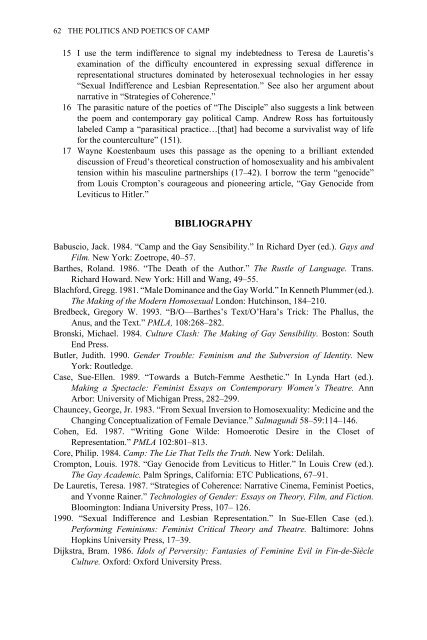Edited by Moe Meyer - Get a Free Blog
Edited by Moe Meyer - Get a Free Blog
Edited by Moe Meyer - Get a Free Blog
Create successful ePaper yourself
Turn your PDF publications into a flip-book with our unique Google optimized e-Paper software.
62 THE POLITICS AND POETICS OF CAMP<br />
15 I use the term indifference to signal my indebtedness to Teresa de Lauretis’s<br />
examination of the difficulty encountered in expressing sexual difference in<br />
representational structures dominated <strong>by</strong> heterosexual technologies in her essay<br />
“Sexual Indifference and Lesbian Representation.” See also her argument about<br />
narrative in “Strategies of Coherence.”<br />
16 The parasitic nature of the poetics of “The Disciple” also suggests a link between<br />
the poem and contemporary gay political Camp. Andrew Ross has fortuitously<br />
labeled Camp a “parasitical practice…[that] had become a survivalist way of life<br />
for the counterculture” (151).<br />
17 Wayne Koestenbaum uses this passage as the opening to a brilliant extended<br />
discussion of Freud’s theoretical construction of homosexuality and his ambivalent<br />
tension within his masculine partnerships (17–42). I borrow the term “genocide”<br />
from Louis Crompton’s courageous and pioneering article, “Gay Genocide from<br />
Leviticus to Hitler.”<br />
BIBLIOGRAPHY<br />
Babuscio, Jack. 1984. “Camp and the Gay Sensibility.” In Richard Dyer (ed.). Gays and<br />
Film. New York: Zoetrope, 40–57.<br />
Barthes, Roland. 1986. “The Death of the Author.” The Rustle of Language. Trans.<br />
Richard Howard. New York: Hill and Wang, 49–55.<br />
Blachford, Gregg. 1981. “Male Dominance and the Gay World.” In Kenneth Plummer (ed.).<br />
The Making of the Modern Homosexual London: Hutchinson, 184–210.<br />
Bredbeck, Gregory W. 1993. “B/O—Barthes’s Text/O’Hara’s Trick: The Phallus, the<br />
Anus, and the Text.” PMLA, 108:268–282.<br />
Bronski, Michael. 1984. Culture Clash: The Making of Gay Sensibility. Boston: South<br />
End Press.<br />
Butler, Judith. 1990. Gender Trouble: Feminism and the Subversion of Identity. New<br />
York: Routledge.<br />
Case, Sue-Ellen. 1989. “Towards a Butch-Femme Aesthetic.” In Lynda Hart (ed.).<br />
Making a Spectacle: Feminist Essays on Contemporary Women’s Theatre. Ann<br />
Arbor: University of Michigan Press, 282–299.<br />
Chauncey, George, Jr. 1983. “From Sexual Inversion to Homosexuality: Medicine and the<br />
Changing Conceptualization of Female Deviance.” Salmagundi 58–59:114–146.<br />
Cohen, Ed. 1987. “Writing Gone Wilde: Homoerotic Desire in the Closet of<br />
Representation.” PMLA 102:801–813.<br />
Core, Philip. 1984. Camp: The Lie That Tells the Truth. New York: Delilah.<br />
Crompton, Louis. 1978. “Gay Genocide from Leviticus to Hitler.” In Louis Crew (ed.).<br />
The Gay Academic. Palm Springs, California: ETC Publications, 67–91.<br />
De Lauretis, Teresa. 1987. “Strategies of Coherence: Narrative Cinema, Feminist Poetics,<br />
and Yvonne Rainer.” Technologies of Gender: Essays on Theory, Film, and Fiction.<br />
Bloomington: Indiana University Press, 107– 126.<br />
1990. “Sexual Indifference and Lesbian Representation.” In Sue-Ellen Case (ed.).<br />
Performing Feminisms: Feminist Critical Theory and Theatre. Baltimore: Johns<br />
Hopkins University Press, 17–39.<br />
Dijkstra, Bram. 1986. Idols of Perversity: Fantasies of Feminine Evil in Fin-de-Siècle<br />
Culture. Oxford: Oxford University Press.


